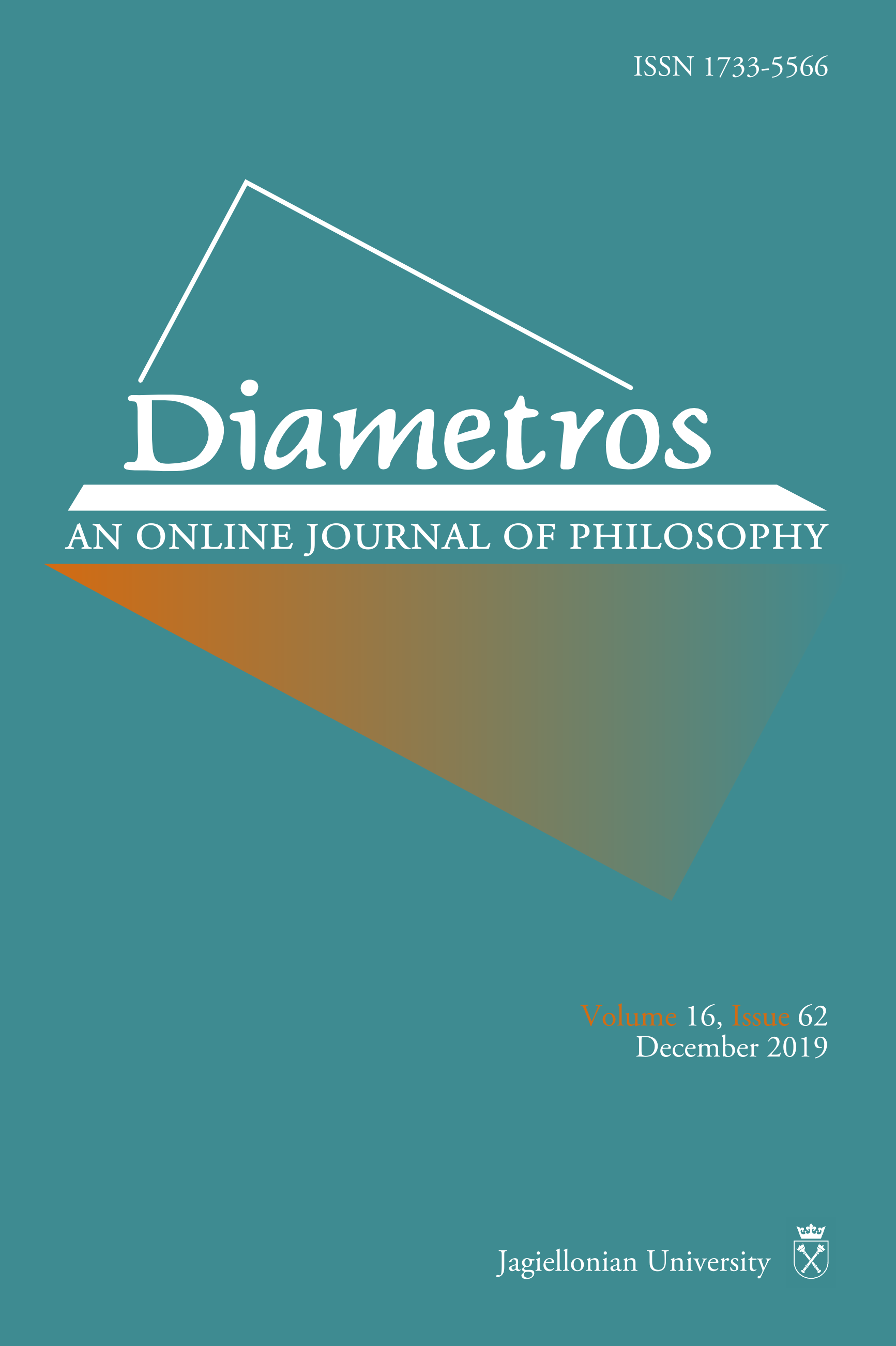A Contribution to a Politico-Liberal Model of Judgment
Main Article Content
Abstrakt
The paper intends to initiate a discussion on the politico-liberal concept of judgment. It is argued that whilst political liberalism (PL) – presented as an account of political objectivity – already appeals to judgment, this conception is an unsatisfactory one. This critical assessment is supported by the juxtaposition of PL with an Arendtian understanding of political objectivity which offers a more robust account of judgment. In the conclusion, the possibility of applying the Arendtian solution to PL is outlined.
Article Details
Numer
Dział
Teksty zaproponowane do naszego czasopisma nie powinny być nigdzie publikowane przed ukazaniem się w „Diametros”. Wraz z przesłaniem swojego utworu redakcji autor akceptuje, że w momencie zakwalifikowania tekstu do publikacji czasopismo „Diametros” będzie stosowało licencję the Attribution 4.0 International (CC BY 4.0). Na podstawie tej licencji autorzy zgadzają się, że ich prace mogą być zgodnie z prawem ponownie wykorzystywane do jakichkolwiek celów bez konieczności uzyskania uprzedniej zgody ze strony autora lub wydawcy. Każdy może prace te czytać, pobierać, kopiować, drukować, rozpowszechniać oraz przetwarzać, pod warunkiem poprawnego oznaczenia autorstwa oraz oryginalnego miejsca publikacji. Autorzy zachowują prawa autorskie do swoich utworów bez żadnych innych ograniczeń. Pełna informacja na temat licencji CC BY: https://creativecommons.org/licenses/by/4.0/legalcode.
Jak cytować
Bibliografia
Arendt H. (1961/2006), Truth and Politics, [in:] H. Arendt, Between Past and Future. Eight Exercises in Political Thought, Penguin, New York: 233–259.
Arendt H. (1971/1978, 1977), The Life of the Mind, A Harvest Book, Harcourt Inc., San Diego, New York, London.
Arendt H. (1992), Lectures on Kant’s Political Philosophy, The University of Chicago Press, Chicago.
Barclay L. (2003), “What Kind of Liberal is Martha Nussbaum,” Sats – Nordic Journal of Philosophy 4 (2): 6–23.
Beiner R., Nedelsky J. (eds.) (2001), Judgment, Imagination, and Politics. Themes from Kant to Arendt, Rowman & Littlefield Publishers, Inc., Lanham.
Bendik-Keymer J. (2014), From Humans to All of Life: Nussbaum’s Transformation of Dignity, [in:] Capabilities, Gender, Equality. Towards Fundamental Entitlements, F. Comim, M.C. Nussbaum (eds.), Cambridge University Press, Cambridge: 175–191.
Bendik-Keymer J. (2017), “The Reasonableness of Wonder,” Journal of Human Development and Capabilities 18 (3): 337-355. DOI: https://doi.org/10.1080/19452829.2017.1342385
Biondo F. (2008), “Is Martha Nussbaum Really Political Liberal,” Archives for Philosophy of Law and Social Philosophy 94 (3): 311–324.
Enoch D. (2015), “Political Philosophy and Epistemology: The Case of Public Reason,” URL = http://dx.doi.org/10.2139/ssrn.2601804 [Accessed 20.08.2019]. DOI: https://doi.org/10.2139/ssrn.2601804
Ferrara A.(2008), The Force of the Example. Explorations in the Paradigm of Judgment, Columbia University Press, New York, Chichester. DOI: https://doi.org/10.7312/ferr14072
Kant I. (1790/1987), Critique of Judgment, trans. W.S. Pluhar, Hackett Publishing Company, Indianapolis/Cambridge.
Larmore Ch. (1987/2003), Patterns of Moral Complexity, Cambridge University Press. DOI: https://doi.org/10.1017/CBO9780511625107
Larmore Ch. (1996/2003), The Morals of Modernity, Cambridge University Press, Cambridge. DOI: https://doi.org/10.1017/CBO9780511625091
Mouffe Ch. (1993), The Return of the Political, Verso, London, New York.
Mouffe Ch. (2005), On the Political, Routledge, London and New York.
Nussbaum M.C. (1990/1992), Love’s Knowledge. Essays on Philosophy and Literature, Oxford University Press, Oxford.
Nussbaum M.C. (2000), Women and Human Development. The Capabilities Approach, Cambridge University Press, New York. DOI: https://doi.org/10.1017/CBO9780511841286
Nussbaum M.C. (2001), “Political Objectivity,” New Literary History 32(4): 883–906. DOI: https://doi.org/10.1353/nlh.2001.0056
Nussbaum M.C. (2006/2007), Frontiers of Justice Disability, Nationality, Species Membership, The Belknap Press of Harvard University Press, Cambridge (MA), London (UK).
Nussbaum M.C. (2014), Introduction. Capabilities, Challenges, and the Omnipresence of Political liberalism, [in:] Capabilities, Gender, Equality. Towards Fundamental Entitlements, F F. Comim, M.C. Nussbaum (eds.), Cambridge University Press, Cambridge: 1–15. DOI: https://doi.org/10.1017/CBO9781139059138.002
Rawls J. (1971/1999), A Theory of Justice. Revised Edition, The Belknap Press of Harvard University Press, Cambridge (MA).
Rawls J. (1985), “Justice as Fairness: Political not Metaphysical,” Philosophy and Public Affairs 14 (3): 223-251.
Rawls J. (1987/1999), The Idea of an Overlapping Consensus, [in:] J. Rawls, Collected Papers, Harvard University Press, Cambridge (MA), London (UK): 421–448.
Rawls J. (1993/1996), Political Liberalism, Columbia University Press, New York.
Rawls J. (1997), “The Idea of Public Reason Revisited,” The University of Chicago Law Review 64 (3): 765–807. DOI: https://doi.org/10.2307/1600311
Sjöholm C. (2015), Doing Aesthetics with Arendt. How to See Things, Columbia University Press, New York. DOI: https://doi.org/10.7312/columbia/9780231173087.001.0001
Wenar L (1995), “Political Liberalism: an Internal Critique,” Ethics 106 (1): 32–62. DOI: https://doi.org/10.1086/293777
Wietmarschen H. v. (2018), “Reasonable Citizens an Epistemic Peers: A Skeptical Problem for Political Liberalism,” Journal of Political Philosophy 26 (4): 486–507. DOI: https://doi.org/10.1111/jopp.12152
Zerilli L. M. G. (2005), Feminism and the Abyss of Freedom, The University of Chicago Press, Chicago and London.
Zerilli L. M. G. (2016), A Democratic Theory of Judgment, The University of Chicago Press, Chicago and London. DOI: https://doi.org/10.7208/chicago/9780226398037.001.0001
